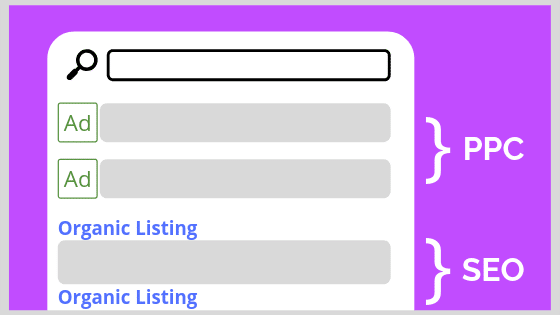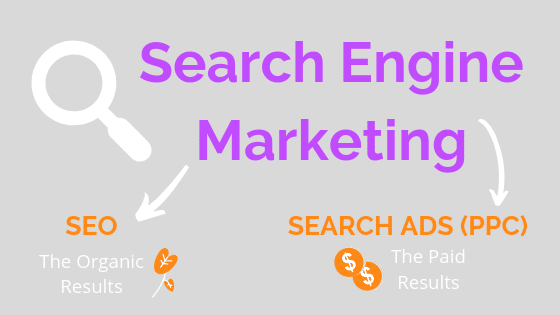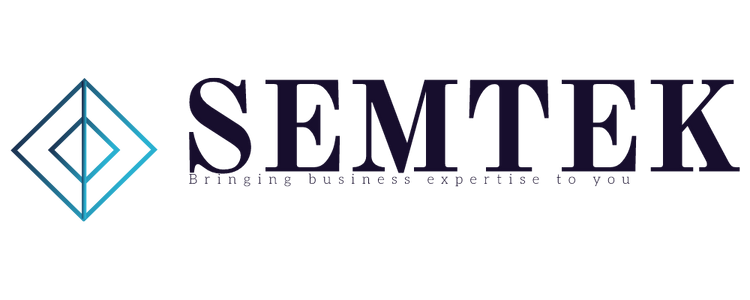Ready to supercharge your website’s performance and see better business results? Here, we’ll cover SEO (search engine optimization) and PPC (pay-per-click) advertising, what they are, the benefits of each individually & most importantly, the benefits of using PPC and SEO together to boost your website’s performance in search results.
Let’s start with a quick overview of each of these two digital marketing tactics.

PPC, or pay-per-click, refers to any form of digital advertising that is paid for based on the number of clicks the advertising receives. Search engines like Google and Bing offer this type of advertisement, as well as social media platforms like Facebook and listing sites like Yelp. Although PPC can be applied across many digital platforms, a large portion of the population uses PPC to refer to the ads on search engine results pages. For the purposes of this article, we will also focus on only the PPC advertisements on the search engine results pages. This includes search ads, local search ads (map ads), product shopping ads, and call only ads.
SEO, also known as search engine optimization, is a branch of digital marketing that focuses on improving the performance of a website in organic results on a search engine results page. This can include improving user experience, creating quality content, optimizing on page search factors, monitoring indexing, researching search query trends, crafting a strategy for targeted searches, and much more. All of this to help a website appear in a higher position on search engine results pages for terms related to a business, its services, and its goals.
Both PPC ads on search engines and search engine optimization are what make up search engine marketing or SEM. Using both PPC & SEO concurrently can have an exponential effect on website performance that outranks the effect of using just one strategy or the other. To understand why, we’ll first take a look at what each strategy can do on its own. Then how they work together to supercharge online performance.

Benefits of SEO
The entire purpose of SEO is to optimize a website or web pages in order to help those pages rank higher on a search engine results page for targeted searches. Why is this so important? Because study after study has shown that most people do not scroll past the first page of search results. And with more than 3.5 billion searches happening on just Google everyday, a business with a website that isn’t appearing for relevant search queries is missing out on a huge audience. Beyond reaching a large audience, here are the key benefits of a strong SEO strategy.
Generally SEO Costs Less Than PPC (Higher Return On Investment)
SEO is a “free” medium, because you don’t directly pay for every click you receive on an organic listing. However, SEO isn’t completely free. It takes time and resources and if you aren’t knowledgeable on the subject, you may end up wasting your resources without seeing any results. This is why it is typically best to hire an SEO expert for assistance. The good news is that even though you do pay something, your return on investment can be quite high in the long run. As an example, if you hire an SEO expert for $500 a month and you receive an increasing number of visitors to your website over a year long period, you are paying less for each visitor and hopefully, if your conversion rates aren’t dropping, you are receiving more paying customers for the same price.
Generate More Traffic
When your SEO strategy is working, your website will generate more traffic. When you are ranking higher in results, more people will naturally visit your website. Additionally, more people click on organic listings than on advertisements.
Build Trust
Search engines are built on trust. Trust that the results that are returned will answer a need, an inquiry, or question. If your website appears higher in search results, that trust translates to your website. People think of your site as reputable and trustworthy, because the search engines do.
Better User Experience = Higher Conversions
A part of SEO is the user experience. When the experience of the user visiting your website is better, this can lead to higher conversion rates. Think of the user experience in terms of ease. The easier it is to use your website, the easier it is for a consumer to convert on your website.
Increase Brand Awareness
Ranking in a higher position and showing up for a broader range of search terms, means more people see your brand in search results. This may not always lead to a click, a sale, or a lead right away, but your brand is out there appearing in front of more consumers organically.
Sustainable
Because you don’t directly pay to reach users, SEO can be a more financially sustainable method than PPC ads in the long run. If your marketing budget is reduced from one year to the next, a smaller portion spent on SEO doesn’t always directly correlate with a reduction in website visits as it does with PPC.
Higher Click Through Rates
How many of you reading this don’t click on the ads when you are searching for information?

You aren’t alone. Different studies cite different numbers, but the overall theme is that most people scroll past the ads. This means more clicks and user attention go to the organic results. When your website is an option in the organic results, it will generally see higher click through rates than an advertisement. A higher click through rate means your listing is perceived as a more valuable and more relevant.
Broader Reach = Capture a Larger Audience
With SEO, your strategy can be targeting specific keywords or phrases that you’d like to appear in results for; however, you aren’t specifically telling search engines this is what you want to show for and nothing else. This gives your site has the ability to show up for a broader range of search queries than it would with PPC. And given that Google has stated that 15% of searches have never been searched before, the broader reach of your SEO strategy can be significant.
Limitations of SEO
Search Engines, not SEO professionals, control where, when, and how your listing appears. If a search engine doesn’t think your website is worth showing, then it won’t show up. Similarly, even when your website is appearing organically in the first position, the ads may still appear before your organic listing. Because you aren’t selecting searches where your website appears, you also aren’t designating the pages the user will land on. This is a search engine’s choice. It gives you as a business owner or website manager less control over what pages your visitors see first after clicking through to your website.
In a similar vein, with organic results you aren’t always able to see the exact search terms or queries someone used to find and click through to your website. This information can be used to make pages more relevant for users, but without it, the job of making landing pages more relevant is more difficult. Another limitation of SEO is that the results are not immediate. Depending on the competition and the market, it can take months, years even, for your website to be ranking highly for the searches that are most relevant or high performing for your business.
Benefits of PPC
Pay-per-click search advertising gives businesses the opportunity to reach their target audience at the moment their audience is actively searching for the products and services their business offers. Given that on average people search for information multiple times a day on search engines, there is a lot of opportunity to connect with your audience and grow your business using search advertising. Let’s take a look at the key benefits of an optimized PPC strategy.
Control
When you start a PPC campaign, you have a lot of control. You can select the keywords and phrases you want to target. You can select the ones you don’t want to target. You control the content of your ad and you control the landing page after someone clicks. You can also add in controls for a geographic region or time of day you’d like your ad to show. All this control leads to the ability to deliver a more relevant message and a more relevant message performs better.
Placement at the Top of the Page
PPC ads have the opportunity to appear at the top of the page, before the organic listings. This means you can use paid search ads to fill in gaps in your SEO strategy until you rank better for keywords organically. An ad at the top of the page or on the first page means more people see your business’s message, even if they don’t click on that advertisement. Which leads to another benefit of PPC…
Brand Awareness
Using ads on terms that you’d like your business to be known for enables more people to see your brand. Even if an ad isn’t clicked on searchers will potentially still need to scroll past your ad to view other results.
Additional Features
When you use ads, search engines give you the ability to add additional features that you don’t have the option of with an organic listing. With ads you can specify specific sitelink extensions, price extensions, location extensions, promotion extensions, and so on. These features are not all available, or are automatically generated for an organic listing.
With product listing ads you have the ability to add images, which makes your ad more compelling. On mobile devices you can create a click-to-call experience which is very convenient for users. All of these additional features give you the opportunity to take up more space on the search engine results page, provide more relevant content, and create a better user experience with your PPC ads.
Marketing Intelligence
Running an ad provides a level of insight into consumer use that you don’t get with organic. When you use search ads, you can see the exact search query that led to a click on your ad. You can also see how your ad copy is performing and tweak it for better results. Knowing this information allows you to create better, more relevant experiences for users, which translates to better results for your business.
Immediate Results
Unlike SEO, PPC results come quickly. You can start a campaign in a day and receive more traffic to your website the same day. An ad campaign can ramp up in a few weeks, and you can start adjusting for better performance and see the impact, right away.
Ability to Test Quickly
The immediate results from PPC search ads gives you the ability to test quickly and make changes that positively impact your business within days or weeks, rather than months or years. You can also test the waters for new products or services quickly with specific ad campaigns.
Limitations of PPC Ads
Cost of PPC is one of the most common limitations of pay-per-click ads. In order to reap all the benefits of PPC, you must be willing to continually spend money otherwise the benefits stop just as quickly as they started. If your PPC budget changes, so will the results of your advertisements. Because PPC requires you to select specific keywords and phrases to target, this narrows the reach of your ads and therefore the reach of your business. Your ads are only going to appear for the terms you’ve selected and nothing more. Working with a PPC expert can help you choose the most effective keywords for your business.
Depending on the industry, paid search ads will usually have a lower click through rate than organic listings. When you rely solely on PPC for your traffic, it means you have a smaller audience and less opportunity for conversion. Depending on your business model, PPC may not be sustainable. When you are working with a PPC expert, you should be able to see the value your ads are providing and decide if your current practice is sustainable or what you need to do to achieve sustainability.
The Benefits of Using PPC & SEO Together
When you use both PPC & SEO together, you receive all the benefits we’ve listed for each tactic individually. Not only that, but when you combine these two in your marketing strategy, it can negate the individual limitations of each tactic on its own and brings even greater awareness, visibility, and information. All these factors together lead to even better business results. Let’s take a look.
Build Greater Trust
As we discussed, the search engines are built on trust. When your brand appears in both paid results AND organic results, your business gains greater trust with consumers. Why? It is psychological, but when you see something appearing in results more than once, it seems more trustworthy coming from a trusted source like a search engine. It’s kind of like two friends recommending something, rather than just one.
Improved Brand Awareness
When you are using both SEO and PPC together your brand has the opportunity to appear more times on the search engine results page for the same search. Not only does this build trust (as we just reviewed), it also allows you to push your competitors further down the page or onto the next page. Even better, you have the chance to do what we call dominate the SERP. Dominating the SERP is when your business is the only business that appears on the SERP above the fold. Meaning a user needs to scroll in order to see listings from any other business. When you are able to do this you not only improve your brand awareness, but you also gain a competitive edge.
Increased Website Traffic
When you have both an ad and an organic listing appearing on the search engine results page, that gives your business twice the opportunity to reach your audience. Additionally, in Google’s economic impact report, they note that one of the underlying assumptions of their impact is this: “… businesses overall receive an average of five clicks on their search results for every one click on their ads.” If we reverse this, it means that if you aren’t using advertising, you may miss 1 of every 6 possible clicks or 17% of the potential traffic. Using both together gives your business the best opportunity for the most traffic and the more traffic you have, the greater the opportunity you have to convert more customers and grow your business.
Increased Confidence
Another benefit of PPC & SEO together is the increase in confidence in your business. This confidence, like trust, comes when consumers see your business name more often. If your business is doing well enough to advertise and also show up in organic results, this gives consumers more confidence in your brand. Using SEO and PPC together gives your business a confidence boost.
Enhanced Strategy
When you have the insight into what users are actually searching when they click on your PPC ads, you can use this information to improve your organic strategy. If you see a key phrase appearing or similar phrases you haven’t yet included on your website, you can make adjustments to capture this audience organically in addition to those you are already reaching via ads.
Remarketing to Organic Users
While you can use remarketing to recapture the attention of users have visited your site via an ad, you can also use this strategy to target organic users who visited your website. This remarketing to organic users allows you to re-engage with previous users and stay top of mind. Knowing what content or pages users visited can help you to target these users with more relevant messages when remarketing. Using PPC and SEO together for remarketing can be one of the most efficient ways to boost your website performance and re-engage your audience.
Better Landing Pages = Savings
Because a component of SEO is user experience, and landing page relevance and experience are a component of your ad quality scores, actively using SEO can translate to higher ad quality scores. Whether you create specific landing pages for your ads or use pages already built on your website, SEO knowledge of how to improve the user experience will work in your favor towards better landing pages and higher ad quality scores. When you have higher quality scores, you pay less for your advertisements. This translates to savings for your business.
Relative Stability
As the saying goes, don’t put all your eggs in one basket. When you diversify your marketing strategies and use PPC and SEO together you can create more stability for your brand in search results. With PPC, your ad is not subject to fluctuations and changes to search engine algorithm updates. Using SEO, your organic listing is not subject to ad policy changes or increasing prices due to demand or competition variations. When you use both together you create a more stable environment to maintain website traffic despite swings in policy, price, or search engine algorithms.
Short & Long Term Performance
As mentioned before, while SEO typically takes a longer time to see results, PPC can give you more immediate results. Using these two together gives you the benefit of both immediate and long term results. If you choose to use just one or the other, you can miss out on either the immediate opportunities available OR the future performance gains that can be realized with efficient SEO strategies. Putting them together gives you the best opportunity to reach consumers now and in the future.
Although on their own each of these two tactics provide a large amount of benefits, using PPC & SEO together is the BEST way to supercharge performance of your website to reach your goals faster and increase the efficiency of your marketing both in the immediate future and long term. Not only do you reap the benefits of both of these individual methods, but you can also use the learning from one to inform and enhance the results of the other.
Do you currently use both SEO and PPC together or do you focus on just one right now? Have you seen any other benefits beyond what we’ve listed here? Let us know in the comments below.
Pro Tip: It is important to always have a goal and strategy in place for your search engine marketing efforts. If you need help or are unsure of the type of goals to set or the strategy you can employ for your business, send us a message, we’d love to help!
- Home page
- Content Marketing
- Digital Marketing Strategy
- Digital Marketing Strategy
- Digital Marketing Strategy
- PPC
- SEO
- Social maketing
- WordPress web development


